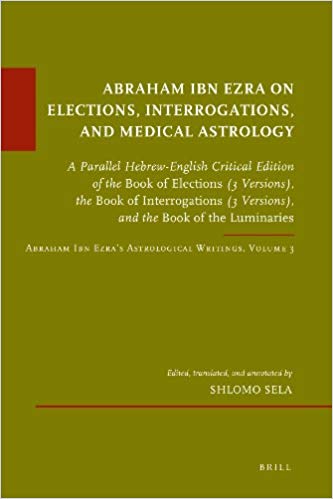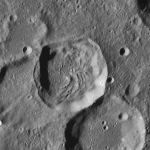Background
Abraham ibn Ezra was born c. 1089 in Tudela, Spain. While still a youth he won a reputation as a Hebrew poet and a scholar in various branches of learning. Nevertheless, he experienced much suffering and poverty.

The crater Abenezra on the Moon was named in his honor of Ibn Ezra.

(The Beginning of Wisdom is a one of the most important of...)
The Beginning of Wisdom is a one of the most important of the basic medieval texts of astrology. Originally written in Hebrew by Ibn Ezra it was translated into old French by Hagin de Juif and thence into Latin by Peter of Abano among others. It served as the backbone to an extensive and quite complete textbook of astrology by Ibn Ezra which which also included The Book of Reasons, The Book of Nativities and others.
http://www.amazon.com/gp/product/096622664X/?tag=2022091-20
1998

(This volume offers the first critical edition of the Hebr...)
This volume offers the first critical edition of the Hebrew text, with English translation and commentary, of seven astrological treatises by Abraham Ibn Ezra.
https://www.amazon.com/Abraham-Elections-Interrogations-Medical-Astrology/dp/9004212205/?tag=2022091-20
2011
אַבְרָהָם אִבְּן עֶזְרָא
Astronomer linguist mathematician philosopher scientist writer poet
Abraham ibn Ezra was born c. 1089 in Tudela, Spain. While still a youth he won a reputation as a Hebrew poet and a scholar in various branches of learning. Nevertheless, he experienced much suffering and poverty.
Nothing in particular is known about his education as he led a life of restless wandering.
Ibn Ezra was a wandering scholar who never settled in any place for long. Initially, he traveled from place to place in Spain but at the age of about fifty he began to wander to other countries. It has been suggested that his first such journey, to the Middle East (Egypt, Eretz Israel, and Mesopotamia), was connected with the conversion of his son, Isaac, to Islam and his attempts to win him back. Returning to Spain he briefly found a benefactor but after the latter’s death, set forth again.
He lived in Rome for some time (1140-1145), receiving honor and recognition from the Jews of the city. While there his literary activity included commentaries on Job and Ecclesiastes, books of grammar, and poetry. He then spent a few years in other Italian cities including Verona (1147-1148), before moving to France where he lived for ten years, again in several cities. From 1158 to 1160 he was in England. He then returned to France and Spain, dying at Calahorra, on the borders of Navarre and Aragon.
Three of his treatises were devoted to numbers. Sefer haehad (“Book of the Unit”) describes the theory of numbers from one to nine; Sefer hamispar (“Book of the Number”) is on the fundamental operations of arithmetic. The latter describes the decimal system for integers with place value of the numerals from left to right, and the zero is given as galgal (“wheel” or “circle”) in the preface. In the body of the treatise, however, Ibn Ezra returns to use of the letters of the Hebrew alphabet as numerals. The Indian influence is, nevertheless, unmistakable. The third book, Yesod mispar (“The Foundation of Numerals”), is concerned with grammatical peculiarities.
In Ibn Ezra’s translation of al-Blrimt’s Ta’ame lühöt al-Chowärezml (“Commentary on the Tables of al-Khwärizml”; the Arabic original is lost) there is interesting information on the introduction of Indian mathematics and astronomy into Arabic science during the eighth century.
Ibn Ezra was concerned with permutations and combinations, as is shown in his Sefer Ha-’Olam (“Book of the World”). In addition to treatises on the calendar, Shalosh she’elot (“Three Chronological Questions”) and Sefer ha- ’ibbur (“Book on Intercalation”), and the astrolabe, Kelt ha-nehoshet (“The Astrolabe”), Ibn Ezra wrote a number of astrological works (Steinschneider lists more than fifty) that were very popular and were translated into many languages. Two were printed in Latin in 1482 and 1485, respectively; and all of them appeared in Latin in 1507. Only two of the Hebrew originals have been printed, both in modern times. They are rich in original ideas and in the history of scientific subjects. The astrological works were translated into French in 1213 by Hagin, a Jew in the employ of Henry Bate at Malines (Mechelen), who in turn translated the French into Latin. Both the French and the Catalan translations are of great philological interest.
He was also a distinguished poet, whose verse spanned a wide variety - sacred poems, poems of friendship, love, and wine, and didactic poems on science. He even wrote a long poem on chess, describing all the rules of the game. A master of the Hebrew language, some of his poems are constructed ingeniously and can be read in two directions or are based on alliteration. His sacred poems express his deep religious soul and he was also the author of a long philosophical poem.

A versatile genius with a charming Hebrew style, Ibn Ezra disseminated rationalistic and scientific Arabic learning in France, England, and Italy. Notwithstanding his respect for tradition, he made a number of daring observations that led some modern critics to acclaim him as the forerunner of biblical criticism. His work as a Jewish biblical commentator was much admired by Spinoza.
The crater Abenezra on the Moon was named in honor of Ibn Ezra.
Robert Browning's poem Rabbi Ben Ezra, beginning "Grow old along with me/The best is yet to be", a meditation on Ibn Ezra's life and work, appeared in Browning's Dramatis Personae in 1864.
(Ibn Ezra opens the Yesod Mora with an evaluation of the v...)
1995(This volume offers the first critical edition of the Hebr...)
2011(The Beginning of Wisdom is a one of the most important of...)
1998Ibn Ezra's philosophic views were mainly derived from his Bible commentary. His philosophy was in the Neo-Platonic tradition and of limited originality. He divided the universe into three worlds. The highest, eternal world is that of separate intelligences or angels; the intermediate world, also eternal, comprises the nine spheres, the seven planets, and the fixed stars; and the lowest is composed of the four elements and their mixtures, of which man is the noblest. The universe was created in time by God, acting through his angels. After death, the reward of the righteous is his reabsorption into the world soul. Man’s most important activity is knowledge of God.
He considered the physical sciences and astrology fundamental for every branch of Jewish learning.
Quotations:
"Desire blinds the wise."
"The evil of the eye grows from the evil of the heart."
"Many man who do not fear God wrap themselves in a prayer shawl."
"Man was not brought into this world to enjoy himself."
"Reason is the angel that mediates between God and man."
"A little sin becomes a big sin when committed by a big man."
"Fruits take after their roots."
"Wisdom engenders humility."
"Were I to deal in candles, the sun would never set. Were I to trade in shrouds, men would live forever."
There is a legend that Ibn Ezra died in England from a fever and a sickness that came upon him after an encounter with a pack of wild black dogs. This legend is attached to the belief that he denied the existence of demons.
In Granada, it is said, Ibn Ezra met his future friend (and perhaps his father-in-law) Yehuda Halevi.
